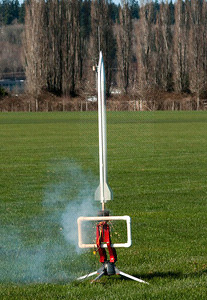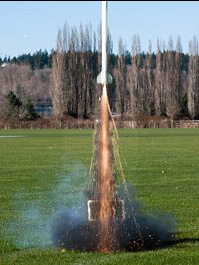Madcow Rocketry Arcas (Fiberglass)
Madcow Rocketry - Arcas (Fiberglass) {Kit}
Contributed by Ken Tsai
| Construction Rating: | starstarstarstarstar_border |
| Flight Rating: | starstarstarstarstar |
| Overall Rating: | starstarstarstarstar_border |
| Published: | 2010-02-25 |
| Manufacturer: | Madcow Rocketry  |

Brief:
This is the fiberglass Arcas HV from Madcow. I bought it because they were giving away CTI
Pro29 3g motors with purchase, so it becomes close to a no brainer if you're in the market for the case (I was) and a
fiberglass kit.
Construction:
Aside from it being fiberglass, this kit is almost as simple as a rocket can be. Sure,
it's sport-scale, but it really is just 4FNC.
The body tube is a single full length unit. Nose cone, fins, motor mount, and centering rings are also all fiberglass.
Recovery hardware isn't fiberglass, which is a good thing. Eyebolts, strap nylon, and various washers and nuts complete the package. I ordered mine without the recovery system because I already had appropriately sized Nomex® and chutes.
I dumped the nylon in favor of Kevlar® and added an Aeropack 29 for motor retention duty.
Being a fundamentally simple kit, the instructions were fairly sparse, but adequate.
Washing everything is mandatory with all the fiberglass parts in order to remove and residual coatings.
In my kit, the fin slots were a tad narrow, of the fins a tad thick. A quick pass with a nail file widened the slots nicely. The only other fit issue I had was the bulk plate that goes into the nose cone. The plate was fairly loose, though it has to be because of the way the fiberglass is laid up inside the cone: it's pretty rough on the inside.
I used epoxy clay to solve that one. I ran a bead inside the cone, and pressed the bulkhead into it forming a fillet on the interior side. I then ran a bead of the clay around the visible side, and pressed the clay into the gap basically sandwiching the bulkhead between two fillets. It's not going anywhere. Luckily, I remembered to attach the eyebolt, washers, and nuts prior to making said sandwich.
For the fin can, I dry fit all the parts outside the tube. To attach the top centering ring, I put epoxy on the top ring while everything was dry fit together. Thinking I was brilliant, I then followed by using JB Weld on the motor retainer and the lower centering ring, knowing that the gap between the two rings would be perfect.
Roughly 24 hours later, I was feeling pretty dumb, as I no longer had any means to do internal fillets on the fins. Whoops. Remember to take a page from the PML instructions on this one - give yourself some kind of handhold on the lower ring. Attach the upper as I did, then put the mount in the body tube gluing in only the upper ring. When that's dry, remove the lower ring, and install the fins. Now you can fillet the fins internally, or fill it with expanding foam, or... lots of other options. Finish by reinstalling the lower ring and sandwich the fins between the two rings. Install motor retention, and call it good.
Finishing:
I can't really comment on finishing. I tend to fly my rockets prior to paint and finish.
Basically, they earn their paint. I find that if I'm going to lose a rocket for some reason, it tends to happen in the
first few flights. So, I don't bother with finishing until I feel that the rocket is going to stick around.
Since this Arcas ended up being my L1 flight, it's definitely earned paint, so it will be going into the paint booth soon.
Construction Rating: 4 out of 5

Flight:
The best part about this rocket is the wide range of motors that it can fly on. While I
haven't tried it, I've run sims, and it looks like it will fly just fine on a high impulse F like the F52T. On the
opposite side of the spectrum, this rocket is fiberglass, and is as close to bulletproof as it gets. I would have no
hesitation flying this on the largest 29mm motor available, which is currently a small I.
To go even further, I wouldn't hesitate to modify it to take a 38mm motor or even a 54mm. It would definitely need the aid of dual-deployment, though as you would be looking at some fairly extreme altitudes.
Recovery:
With nearly 4' of 2.6" tubing available, prepping and packing this rocket for flight is
about as easy as it could be. The Nomex®
chute protector always does it's job, and for my L1 flight, I even went down to a 24" chute from the recommended
30. The field was fairly soft, and also somewhat small for the H motor, so I went small to reduce drift knowing that
the rocket would do more damage to the dirt than vice versa.
Flight Rating: 5 out of 5
Summary:
This is a solid rocket. Simple, rugged. It was my first fiberglass rocket, and I know it
won't be my last. I've always disliked the fact that rockets were essentially designed to fail because of the wear and
tear on the paper body tubes. The constant stream of repairs just isn't really fun after a while. I want to build new
rockets, not keep rebuilding old ones. This is one rocket I know I won't have to rebuild ever. It there's ever any
damage to this rocket, it will likely be destroyed at the same time.
Overall Rating: 4 out of 5
Other Reviews
- Madcow Rocketry Arcas (Fiberglass) By Peter Lam (November 21, 2009)
This is a single stage 1:1.7 scale all G10 fiberglass kit with a 29mm motor mount. The kit can be purchased either with or without a recovery system. The kit is composed of: body tube, fins, centering rings, nosecone bulkhead, which are all G10 fiberglass. 2 eye bolts, 2 nuts, 2 washers, 2 1/4" launch lugs and about 10 feet of 1/2" tubular nylon. The ...
 |
 |
Flights
 |
 |








